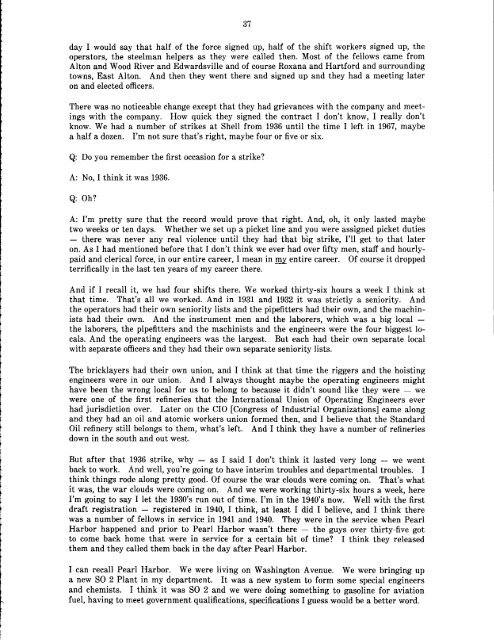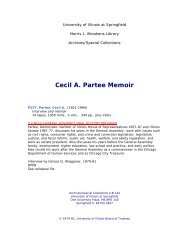Leland J. Kennedy Memoir - University of Illinois Springfield
Leland J. Kennedy Memoir - University of Illinois Springfield
Leland J. Kennedy Memoir - University of Illinois Springfield
Create successful ePaper yourself
Turn your PDF publications into a flip-book with our unique Google optimized e-Paper software.
day I would say that half <strong>of</strong> the force signed up, half <strong>of</strong> the shift workers signed up, the<br />
operators, the steelman helpers as they were called then. Most <strong>of</strong> the fellows came from<br />
Alton and Wood River and Edwardsville and <strong>of</strong> course Roxana and Hartford and surrounding<br />
towns, East Alton. And then they went there and signed up and they had a meeting later<br />
on and elected <strong>of</strong>ficers.<br />
There was no noticeable change except that they had grievances with the company and meetings<br />
with the company. How quick they signed the contract I don't know, I really don't<br />
know. We had a number <strong>of</strong> strikes at Shell from 1936 until the time I left in 1967, maybe<br />
a half a dozen. I'm not sure that's right, maybe four or five or six.<br />
Q: Do you remember the first occasion for a strike?<br />
A: No, I think it was 1936.<br />
Q: Oh?<br />
A: I'm pretty sure that the record would prove that right. And, oh, it only lasted maybe<br />
two weeks or ten days. Whether we set up a picket line and you were assigned picket duties<br />
- there was never any real violence until they had that big strike, 1'11 get to that later<br />
on. As I had mentioned before that I don't think we ever had over fifty men, staff and hourlypaid<br />
and clerical force, in our entire career, I mean in my entire career. Of course it dropped<br />
terrifically in the last ten years <strong>of</strong> my career there.<br />
And if I recall it, we had four shifts there. We worked thirty-six hours a week I think at<br />
that time. That's all we worked. And in 1931 and 1932 it was strictly a seniority. And<br />
the operators had their own seniority lists and the pipefitters had their own, and the machinists<br />
had their own. And the instrument men and the laborers, which was a big local -<br />
the laborers, the pipefitters and the machinists and the engineers were the four biggest locals.<br />
And the operating engineers was the largest. But each had their own separate local<br />
with separate <strong>of</strong>ficers and they had their own separate seniority lists.<br />
The bricklayers had their own union, and I think at that time the riggers and the hoisting<br />
engineers were in our union. And I always thought maybe the operating engineers might<br />
have been the wrong local for us to belong to because it didn't sound like they were - we<br />
were one <strong>of</strong> the first refineries that the International Union <strong>of</strong> Operating Engineers ever<br />
had jurisdiction over. Later on the CIO [Congress <strong>of</strong> Industrial Organizations] came along<br />
and they had an oil and atomic workers union formed then, and I believe that the Standard<br />
Oil refinery still belongs to them, what's left. And I think they have a number <strong>of</strong> refineries<br />
down in the south and out west.<br />
But after that 1936 strike, why - as I said I don't think it lasted very long - we went<br />
back to work. And well, you're going to have interim troubles and departmental troubles. I<br />
think things rode along pretty good. Of course the war clouds were coming on. That's what<br />
it was, the war clouds were coming on. And we were working thirty-six hours a week, here<br />
I'm going to say I let the 1930's run out <strong>of</strong> time. I'm in the 1940's now. Well with the first<br />
draft registration - registered in 1940, I think, at least I did I believe, and I think there<br />
was a number <strong>of</strong> fellows in service in 1941 and 1940. They were in the service when Pearl<br />
Harbor happened and prior to Pearl Harbor wasn't there - the guys over thirty-five got<br />
to come back home that were in service for a certain bit <strong>of</strong> time? I think they released<br />
them and they called them back in the day after Pearl Harbor.<br />
I can recall Pearl Harbor. We were living on Washington Avenue. We were bringing up<br />
a new SO 2 Plant in my department. It was a new system to form some special engineers<br />
and chemists. I think it was SO 2 and we were doing something to gasoline for aviation<br />
fuel, having to meet government qualifications, specifications I guess would be a better word.
















